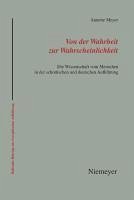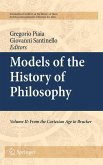In the 18th century, the science of man opened up the conceptual framework for re-interpreting the origins and development of the human species itself. It was the ever more popular reports of 'savages' which had led to a questioning of the biblical account of Creation. Borrowing from scientific methods, the Scottish Enlightenment developed a model of hypothesis-led empirical research into humankind. German popular philosophy in particular carried this conception forward in a variety of ways, but their ability to establish connections and their creativity fell into oblivion as a result of the specialisation and disciplining of the field at the beginning of the 19th century.
Dieser Download kann aus rechtlichen Gründen nur mit Rechnungsadresse in A, B, BG, CY, CZ, D, DK, EW, E, FIN, F, GR, HR, H, IRL, I, LT, L, LR, M, NL, PL, P, R, S, SLO, SK ausgeliefert werden.
"Überzeugend ist A. Meyer vor allem in der souveränen kritischen Übersicht des Forschungsstandes, in der stringenten, die unterschiedlichen historiographischen Modelle voneinander abgrenzenden Systematisierung der Ergebnisse sowie in der Konsequenz bei der Durchführung ihres Anliegens."
Mario Marino in: Berichte zur Wissenschaftsgeschichte 4/2009
Mario Marino in: Berichte zur Wissenschaftsgeschichte 4/2009


